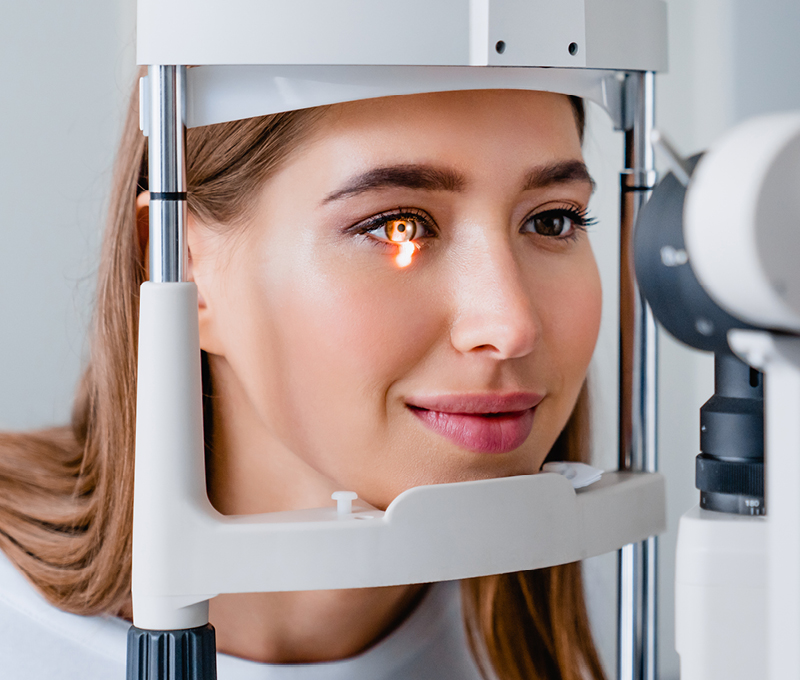Ask Our Experts
THE EYE CARE EDITION
Ask Our Experts
National Pharmacies Optical Optometrist, Cameron Girgenti and National Pharmacies Pharmacist, Kerry-Anne Casanova answer your questions about eye care.
The following questions have been answered by Optometrist, Cameron Girgenti.
How old should you be to get your first eye test?
Prior to school, around the age of 3 years, to ensure optimum vision for the learning environment and normal ocular development.
What should you expect in your first eye examination?
An eye examination involves a discussion about any visual problems, assessment of vision on a chart, comparing a series of lenses for clarity and a series of lights shone into the eye. There are no painful procedures.
What are those floaty things in your eyes?
Unsurprisingly they are called floaters! These are particles that float around in the jelly substance at the back of the eye. Although they are common and mostly benign, floaters can be the sign of a more serious problem and an eye examination is recommended if floaters are detected, particularly if they are new.
Why should you get your eyes tested? When? How often?
You only have one pair of eyes and vision is our most precious sense. An eye exam is important whenever a change to your eyes or vision is detected. Following the guidance of your Optometrist a routine eye exam

should occur every 1 to 3 years depending on your age, vision problems or health status.
Is it a myth that wearing glasses weakens your eyes, becoming more dependent?
Yes. There is no evidence that this is true. Often people in their early forties link the changes to their vision over time with spectacle wear. Unfortunately, this is an unavoidable age-related problem that occurs regardless of spectacle use. In fact, for certain visual problems in children, not wearing spectacles can actually be harmful to the eye’s development.
The following questions have been answered by Pharmacist Kerry-Anne Casanova.
How do I clean my newborn’s eyes?
Removing secretions and crusted matter around a newborn’s eye can be done safely by using a hypoallergenic and pH balance cleansing eye wipe. Ensure that it is preservative and fragrance free so that it will not harm little eyes.
Why are my eyes red? And what can I do to relieve them?
Red eyes can occur for various reasons, including allergies, irritations and fatigue. Rest, cool compress and some over the counter eye drops will help to relieve the red eye. However, if the red eye is persistent a visit to the Optometrist is highly recommended to rule out any more serious conditions.
Are there any medications that can affect my eyes?
Many medications can have an adverse affect on your eyes. It is important to take the time to discuss medications with your Pharmacist, especially if you have not had them dispensed previously.
Does it matter what solution I use with my contact lenses?
Contact lenses can be damaged if the wrong solutions are used. It is important to ensure that the solution used is compatible with your contact lenses. Most products are labeled if they are safe to use with contact lenses.
Can I get ready-made glasses from the pharmacy?
We have a large selection of ready-made glasses with various magnifications available. We also have a good selection of Cancer Council approved sunglasses available, including a children’s range.
Can I share my eye drops and do they expire?
You should never allow others to use your eye drops. This ensures that infections are not transferred from person to person. Bottled eye drops are convenient if used every day. For occasional use, I recommend single-use vials, as bottles will need to be discarded 4 weeks after opening.
My eyes are itchy, what do you suggest?
Most commonly a result of an allergy, there are several products available to reduce irritation. Cool eye washes and antihistamine eye drops will assist to give relief, some with a rapid onset. Itchy eyes with a sticky discharge could indicate either a viral or bacterial infection. Speak with your Pharmacist who could suggest an alternative Pharmacist only treatment available.
The information provided here should not be used in lieu of speaking with a healthcare professional. If you’re experiencing symptoms visit your GP or local National Pharmacies Pharmacist or Optometrist.
References
1. Saunier V, Merle BMJ, Delyfer M, et al. Incidence of and Risk Factors
Associated With Age-Related Macular Degeneration: Four-Year Follow-up From the ALIENOR Study. JAMA Ophthalmol. 2018;136(5):473–481.
2. AREDS2 Research Group et al. “The Age-Related Eye Disease Study 2 (AREDS2): study design and baseline characteristics (AREDS2 report number 1).” Ophthalmology vol. 119,11 (2012): 2282-9.
3. Ziemanski, Jillian F et al. “Relation Between Dietary Essential Fatty Acid Intake and Dry Eye Disease and Meibomian Gland Dysfunction in Postmenopausal Women.” American journal of ophthalmology vol. 189 (2018): 29-40.